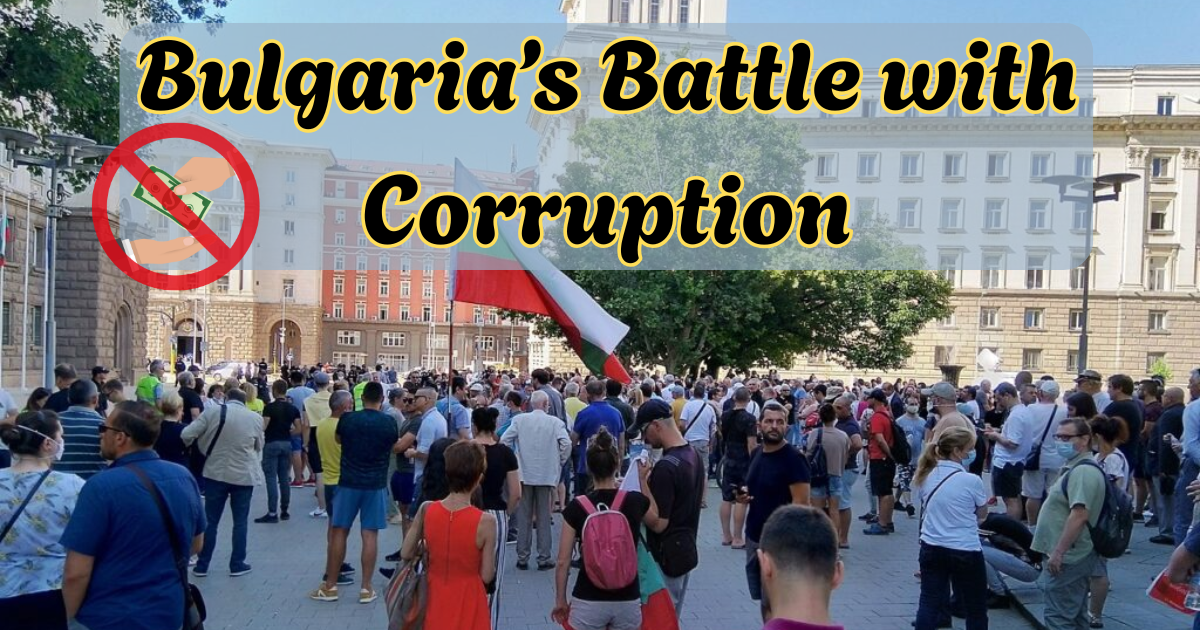Bulgaria’s Battle with Corruption: The 2020–2021 Protests: The Bulgarian protests of the summer of 2020 constitute an unusual eruption of political energy. Bulgaria has been known for its apathy and lack of social mobility, with many of its young people emigrating to the West for at least two decades. Today the younger generation – people in their twenties – are the most visible face of the protests.
Bulgaria’s Battle with Corruption
The primary emotion behind this release of energy is evidently sincere disgust at the endless cynicism of the ingroups that dominate the country’s political and economic life. At first glance, it looks like the street demands are pretty clear: Resignations of the prime minister, Boyko Borisov, and the chief prosecutor, Ivan Geshev.

The protest is branded as an “ethical” one, beyond right and left, which unites the honest and disgusted to leave; the disgusting remain is a popular saying. But the ethical higher ground is only the beginning, not the end, of what this protest is all about.
Two Approaches
Recently there has been a growing clash between two approaches to anti-corruption in Bulgaria. Bulgaria started to develop its particular form of anti-corruption, consisting, among other things, of the creation of a specialised process of prosecution and a specialised court and court procedure for confiscating illegally acquired property.
On March 5th this year, the prime minister of Bulgaria, Nikolay Denkov, resigned. His government had been elected by Bulgaria’s parliament on June 6th, 2023, after protracted negotiations between Boyko Borissov’s GERB party and the PPDB (We’ll Continue the Change-Democratic Bulgaria) coalition. To many abroad, the election of a regular government last year put an end to a long period of political instability and an election spiral in the country. Yet, already in the summer of 2023, to many at home, the symbiosis between those accused of rampant corruption.
How it started: A beautiful promise for change that was not kept
The 2020 anti-corruption protests, which eventually led to Borissov’s demise, had very clear demands – the resignation of Borissov’s third government and the removal of controversial General Prosecutor Ivan Geshev from office as a first step towards an in-depth reform of Bulgaria’s justice system. Bulgarian citizens believe that only a major overhaul of this system, whose backbone has been inherited from totalitarian times, can lead to proper investigations into the corruption scandals.
Coalition As a dirty word
As it is often the case, politicians do not keep their pre-election promises. Yet in view of the 2020 protests, PP’s and DB’s post-election choices can be seen as sheer betrayal. No wonder PPDB’s political calculations created major problems regarding the coalition with GERB.
Decade of GERB
The party came to power using slogans about fighting corruption and enabling modernisation. Boris built his position by leading Bulgaria out of recession after the 2008 global economic crisis. He also unblocked EU funds suspended by the European Commission (EC) in 2008, a year after Bulgaria’s accession to the EU, due to the enormous scale of corruption in the EU; in 2019 its GDP per capita was 53% of the EU average.
The public, however, increasingly connects GERB with structural corruption. DPS also derives profits from the system in return for supporting Borisov’s party. Bulgarians are also concerned about limitations of media freedom under GERB’s rule. There have been attacks and intimidation of investigative journalists. Oligarchs also buy out anti-government media, for example, Nova TV in 2019.
BorisovTactics
The PM is trying to wait out the protests and avoid escalation with police actions. This has been effective: According to Alpha Research, GERB would win a potential election with just 26.7% of the vote, the rest fractured across other parties. Moreover, GERB’s demand to halve the number of deputies to 120 has triggered a protest from small parties afraid of losing the chance to be elected.
Conclusion
In this article we discussed Bulgaria’s battle with corruption: The 2020–2021 Protests: The Bulgarian protests of the summer of 2020 constitute an unusual eruption of political energy. Bulgarian society supports the protests but is cautious about the demand that the cabinet resign or new elections be called, as it sees no alternative to GERB rule. The ongoing anti-corruption protests are unlikely to affect the closure of the CVM, as stipulated by the EC, even though the mechanism has not fulfilled its role.



